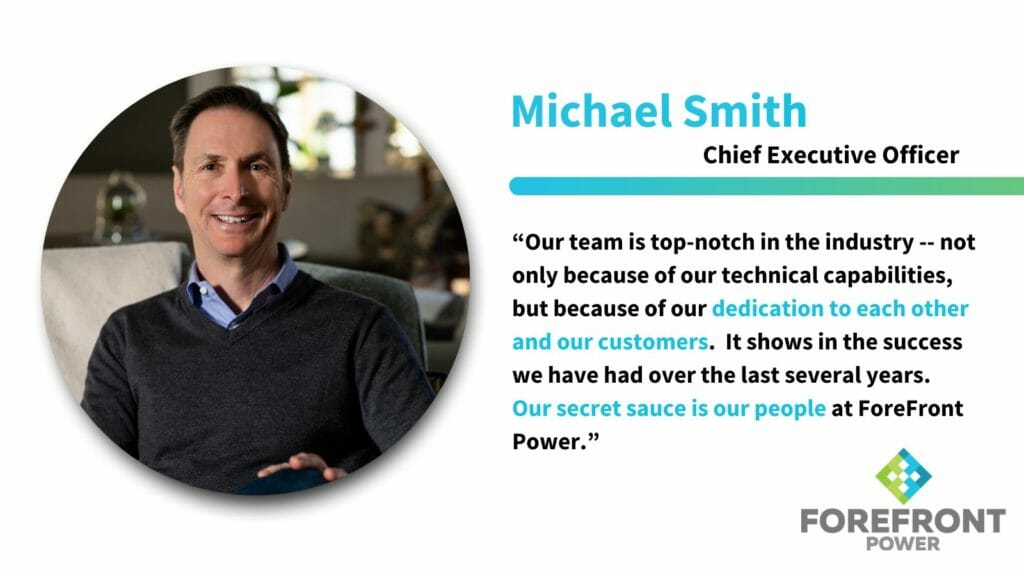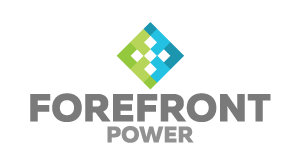This post is the first in a new Q&A series called “We Are ForeFront,” in which we profile members of our team across the U.S. and Mexico.

Where are you from originally?
MS: I grew up in Lancaster, Ohio, a town of about thirty thousand people that’s southeast of Columbus.
What do you like to do in your free time? Do you have any hobbies?
MS: I enjoy outside sports – hiking, water skiing and all the water sports that go along with that. I also play a little golf in my spare time. Then for the inside activities, I really enjoy music. I always have. I collect vinyl records. I play a little guitar for my own entertainment. I grew up in the 80s when punk and alternative were kind of coming into their own, so that informs a lot of my musical tastes.
Who was one of your childhood heroes? What did you want to be when you grew up?
MS: As a kid growing up in Ohio, I was a huge baseball fan and my hero was Pete Rose. My father, grandfather, and I would go drive down to Cincinnati and sit on the third base line to watch Reds games because I wanted to be near Pete Rose. I styled my Little League career after Pete Rose. Things obviously didn’t turn out great for Pete, and he did a lot of things later in his career that would make him kind of an anti-hero, if anything. But that’s who I wanted to be from 1974 to 1977.
In terms of what I wanted to be when I grew up, for as long as I can remember I thought I would be a lawyer. My father practiced law for 30 years and was really good at it. So through osmosis in the home, law became something that I was interested in. I actually did pursue it in my education. Obviously, my career has taken a lot of different twists and turns over the last 30 years.
How did you end up working in the energy field?
MS: I was a trial lawyer in Columbus, and I had the opportunity to represent a couple of individuals from Enron who were tangential to a dispute and needed to give a deposition. After they hired my firm to do it, I represented them in their depositions. Later Enron decided that they needed to have local counsel in Columbus and hired my firm, since I had that previous experience with them. At that fork in the road during my career, I could have said, ‘No thanks. I’m a trial lawyer. That doesn’t make any sense to me.’ Instead I said, ‘Yeah let’s try it!’ So I dropped being a trial lawyer and became a commercial lawyer at Enron for five years, learning all about the electricity and natural gas markets during that period.
After Enron, I did a quick stint back in private law practice, but then I went to Constellation and made the transition from practicing law to being a regulatory affairs professional. That took me closer to the commercial side of the business, representing Constellation’s interest in various policy forums in various states, senate, and federal government.
How did you find ForeFront Power?
MS: I was aware of ForeFront Power through Mitsui. Then when they were looking to fill the CEO role, I was very interested because I knew what ForeFront Power was all about and what the company stands for. It just seemed like a really good fit for what I wanted to do at this stage of my career. I’d been in big energy for 17 years at the time. Constellation / Exelon is a great company, but ForeFront Power focuses on the things I really care about, and that’s what attracted me to the company.
How was the transition into becoming CEO of ForeFront Power?
MS: I came onto ForeFront in November, right in the middle of the Covid pandemic. I still haven’t met anybody in the organization face to face. It’s been extra challenging to lead a complex organization that’s coming off an incredibly successful year via Microsoft Teams, Skype, and telephone calls. But we got it together and made it work thanks to the technology that allowed us to make this transition.
How have you seen the energy industry evolve over the years?
MS: There’s been two watershed events. One of which we’re in the middle of now. The first was in the late 90s with the decision by some states to separate generation, transmission and distribution, thereby allowing customers to shop for their retail energy provider. We call that ‘retail unbundling’. It was a big change in how customers think about controlling their energy costs by controlling the price of the energy they use.
The second big change is the one we’re in now. It’s ‘decentralization,’ where customers take more control of their energy spend by either installing solar and storage or engaging in load response, demand response or energy efficiency programs to reduce the amount of energy that they consume and save on their overall energy costs. That started about 15 years ago and is continuing today. It’s a much more momentous change in the energy industry than retail unbundling because it’s changing the physical configuration of the power grid, not just buying the same electrons from a different person. We’re actually creating new electrons that are created oftentimes behind the customer meter, and customers are doing the things they need to do in deploying resources to control their energy costs.
Looking forward, where do you see the future of the energy industry?
MS: The next phase is the intersection between energy and transportation. As the economy electrifies the transportation sector, the energy sector becomes more integral to the transportation sector as the fueling resource of the future. You’re going to see that with our customers, like school districts, as they begin to think about electrifying their school bus fleet and what that means for mobile storage for those school busses during the day when they’re not transporting kids or as a storage resource or over the summer. All those things represent this convergence. If the first phase was retail unbundling and the second is decentralization, then this third phase is the integration between the energy market and the transportation segment of the economy.
Also, more and more companies are concerned with environmental, social and governance issues, or ESG, as it relates to their employees and their customers. But they still need to show a return on that investment. They’re not going to just throw money away to reach these goals. Our industry is now providing the tools to allow more and more companies to meet their ESG goals in an economically sustainable way as well. I think putting smart minds together to solve those things, not just through the technology, but also through the financial engineering that goes into these deployments is going to be critical.
What is ForeFront Power’s role in building that future?
MS: Building is exactly the right word. That’s what we do. We build renewable power plants and storage systems for our customers, allowing them to realize this idea of self-determination and better control of their energy spend. That’s what we’re all about. Another benefit of that is of course the environmental / sustainability aspect, but it’s really about helping customers with their energy costs and consumption. We have the skill set to originate, engineer, design, build, finance, own, and operate solar and storage systems, not just as a seller or financier, but as a fully rounded developer of these systems. We can help our customers deploy these types of resources. That’s first and foremost. As the company continues to evolve and grow, we will add to our portfolio of products and services, toward the goal of becoming a Total Energy Solutions Provider.
Secondly, we’re a very customer centric organization. We really care about our customers and that helps us further that development effort. I’d be remiss if I didn’t also say the reason we’re able to do all this is because of our people. Our team is top-notch in the industry — not only because of our technical capabilities, but because of our dedication to each other and our customers. It shows in the success we have had over the last several years. Our secret sauce is our people at ForeFront Power.
What are your hopes for the current administration in terms of energy and infrastructure policy?
MS: We have an extremely complex regulatory patchwork that impacts our entire market segment, not just solar and energy storage directly, but indirectly through regulation of the entire cost of generated power, transmission and distribution. From a policy standpoint, I want to say, don’t limit us. Let market prices fully express the relative costs of various generation technologies, including externalities such as environmental harm. If we’re not going to tax carbon, at least provide incentive mechanisms for cleaner technologies to compete on an even playing field with carbon based fuels. This market segment has a history of figuring out ways to be successful and will continue to do so. I get worried when regulators start to fiddle around too much and break more things than they fix.
What advice would you give to young people pursuing energy careers today?
MS: One of the hallmarks of my career has always been a willingness to try something new, saying yes instead of saying no. That’s taken me and a lot of different directions, some of which have been great, some of which have not been so great. But overall, always being open to new opportunities, new possibilities has served me well. I would advise people just coming out into their careers to to be the same thing. You just simply can’t predict what you’re going to be like, what the world’s going to be like. I think being flexible is the right approach. For me, I always thought I wanted to be a lawyer, but I didn’t end up practicing law for all that long. My degree took me one direction and then my career went in various ways from that. Nothing has to be permanent.
ForeFront News
November 19, 2020
ForeFront Power Taps Energy Market Veteran Michael D. Smith as CEO
Interested in learning more?
We would love to discuss how our solutions might be a fit for your organization. Contact one of our solar, storage, or e-mobility experts today:


